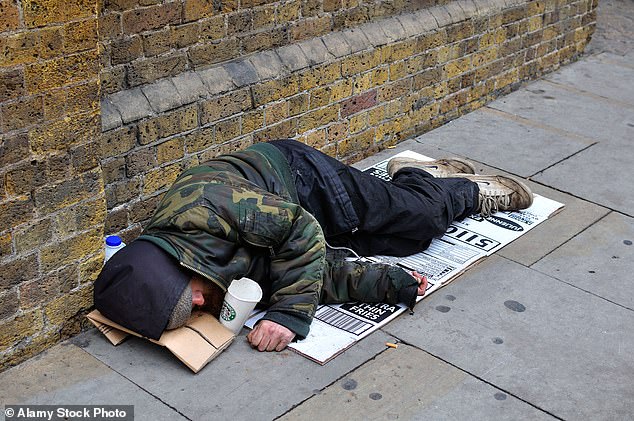Homeless prisoners will be housed in bedsits on their release in bid to keep them on the straight and narrow
- Homeless prisoners will be housed in bedsits and hostels in a £20million plan
- Ministers say it could help prevent the public becoming victims of fresh crimes
- First time ex-offenders will have been housed in private-sector accommodation
Homeless prisoners will be housed in bedsits and hostels on release in a new drive to keep them out of trouble, it can be revealed today.
Ministers say the £20million plan will prevent thousands of law-abiding members of the public becoming victims of fresh crimes and potentially save billions in the cost of reoffending.
Former inmates will be housed in basic hostels and bedsit accommodation if they have nowhere else to live when they reach the end of their prison terms.
Homeless prisoners will be housed in bedsits and hostels on release in a new drive to keep them out of trouble (stock image)
It is the first time ex-offenders will have been housed in private-sector accommodation in this way.
Around 11,000 inmates are freed from prisons in England and Wales each year with no home to go to, which ministers say increases the risk of them going on to commit further crimes.
Another £23million will be spent to create additional space in state-run bail hostels where higher-risk criminals can be supervised on their release.
Prisons and probation minister Lucy Frazer, who details the project exclusively in the Daily Mail today, said: ‘Releasing prisoners without addressing why they ended up there in the first place only leads them to reoffend and cause more harm.
‘By tackling homelessness, we are cutting crime, reducing drug and alcohol misuse and making our streets safer.
‘This low-cost solution has the potential to save billions for the taxpayer and prevent thousands of people becoming victims.’
She insisted the free housing did not amount to a ‘handout’ to lawbreakers, but instead represented a crucial tactic to keep the streets safe.
Miss Frazer said offenders were 50 per cent more likely to break the law again if released without somewhere to stay.
The bedsits pilot scheme will provide housing for up to 12 weeks for about 3,000 offenders in its first year.
While in the scheme, offenders will get help to find a permanent home so there is less reason for them to turn back to crime.
Further funding – taking the total cost to £70million – will go on new training for staff, increased security, and repairs and maintenance at bail hostels, which will be able to house an extra 1,700 prison leavers a year.
A separate Prison Leavers Project, costing £20million, will aim to improve the way offenders are linked up with charities and other groups that provide support in areas such as employment, addiction and counselling.
Another £1million will be spent on encouraging technology start-ups to become involved in the scheme.
A further £6million will be spent on dedicated staff at 11 prisons to help inmates get quicker access to accommodation, healthcare and employment support.
The bedsits scheme will initially be rolled out in five areas of England – the National Probation Service’s Kent, Surrey and Sussex region, the East of England, the North West, Yorkshire and the Humber, and Greater Manchester.
In 2019-20, 2,775 inmates ended up sleeping rough after being released from jails in England and Wales.
Another 8,744 released prisoners were categorised as ‘other homeless’, including those sleeping on friends’ sofas.
